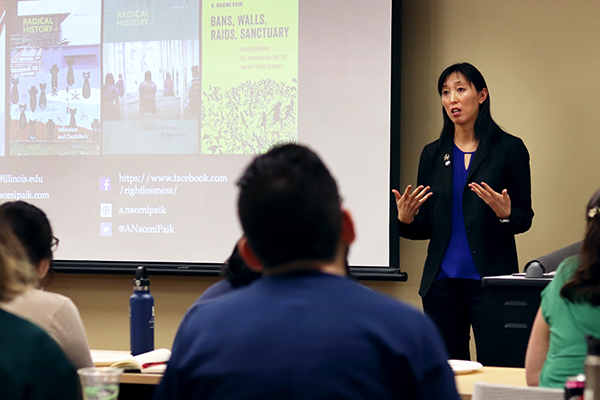A visiting associate professor spoke to the UT community Friday about immigration and American history as a part of the Gender, Race, Indigeneity, Disabilities and Sexuality Studies Initiative.
A. Naomi Paik, an Asian American studies associate professor from the University of Illinois at Urbana-Champaign, explained her current research. Paik’s research argues current immigration policies, such as the Muslim travel ban, the United States and Mexico border wall, and Immigration and Customs Enforcement raids, reflect American policies and practices from the past.
"We need to grapple with the fact that these attacks on our neighbors and our democracy are neither new nor historically unique,” Paik said. “These historical threads are rooted in the settler-colonial foundations of the United States, the origins of immigration restrictions in the late nineteenth century and the escalating processes of criminalization in the late twentieth century to the present.”
Government freshman Ronnie Mazza said she attended the lecture for personal reasons and appreciated Paik’s academic approach to this political topic.
“I wasn’t so aware of my religion, of my parents’ homeland and of our culture in general being different … until (the Muslim travel ban) was put in place,” Mazza said. “We really need to recognize that other people are thinking of (us), and that we all see the problem — it’s not just you, it’s not just in the back of your head.”
Karma Chávez, department chair and associate professor of Mexican American and Latina/o Studies, said academic perspectives are important when discussing immigration.
“We always want to bring in the best, most cutting-edge researchers we can who can challenge the ideas that we take for granted,” Chávez said.
Paik also spoke about sanctuaries, cities or states that limit their cooperation with federal immigration law, according to the Congressional Research Service.
“An abolitionist approach to sanctuary can not only help us defend communities right now, but also help us envision and build the future that we deserve,” Paik said.
Chávez said should students learn about sanctuary from experts such as Paik.
“She’s not just standing up here going off about her politics,” Chávez said. “She’s deeply researched this issue and really thought about it and then brings it for us to consider.”
Mazza said these talks can help inspire people to fight against injustice.
“We have to all mobilize and we have to all come together,” Mazza said. “If we all fight for everyone else’s rights, it’s the same as fighting for your own.”





















